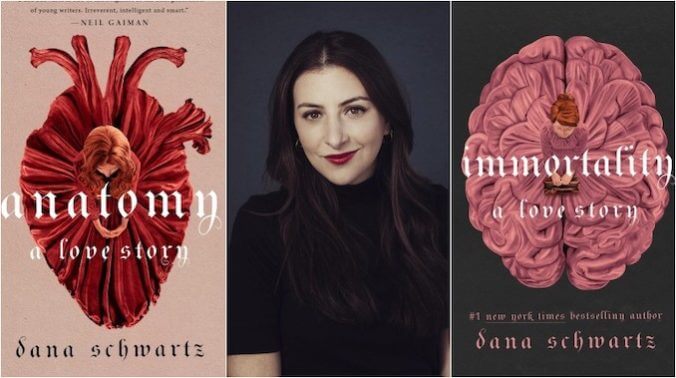Dana Schwartz Initially Didn’t Mean to Write Sequel Immortality: A Love Story
Photo: Sela Shiloni
Dana Schwartz does it all. Or, at least, it often seems like she does. A journalist, TV and film writer, and podcast host (NB: if you haven’t listened to Noble Blood, please fix your life), she’s also now a best-selling YA author thanks to her Anatomy Duology, whose second installment, Immortality: A Love Story hit shelves in February.
The first book in the series, titled Anatomy: A Love Story, is set in 1800s Scotland and follows the story of Hazel Sinnet, the daughter of a minor Scottish lord who wants nothing so much as to become a surgeon and who enlists the help of a handsome young resurrection man (essentially, a grave robber) to acquire dead bodies to learn on. Sequel Immortality sees her summoned to London to treat a gravely ill Princess Charlotte of Wales. Throughout both books, there are murders, romance, various famous figures from history (some of whom have acquired the ability to live forever), and a young woman who refuses to let anyone else write her story.
Following the release of Immortality: A Love Story, we got the chance to chat with Schwartz about the sequel she didn’t initially plan to write, the real history of female medical students in early 19th century England, what makes a good love triangle, and a whole lot more.
![]()
Paste Magazine: Tell me about where the idea for the Anatomy series came from. What made you want to tell Hazel’s story?
Dana Schwartz: I’ve always loved history and it was years ago that I visited Edinburgh for the first time. It is an incredible city. And that’s sort of where I first learned about the dawn of surgery in the late 18th hundreds and the sort of macabre underbelly of history that exists in Edinburgh. And I’ve been fascinated by that ever since. It’s always been in the back of my mind. And eventually I think just being a writer, sometimes ideas stay in your mind and then sometimes they pop into focus. And I was on a plane from New York to Los Angeles and didn’t buy plane wifi on principle ’cause I thought I was going to get work done. And instead I just sort of saw these characters fully formed.
I thought of a young woman who’s a lady who wants to sort of escape from her life and a resurrection man and how their paths might cross. And then it was just filling in the puzzle pieces, wanting to explore all of these different elements about society, wanting to talk about themes of… the way the romantic movement was happening at this time, and also scientific advances were happening so fast, wanting to pull all of that in. And at the heart of it, I also just wanted to really write the story that I would’ve wanted to read as a sort of macabre, spooky, pop-punk-listening teenager.
Paste: What would you call the genre of this series? It’s historical fiction but also a sort of magical, alternate history at the same time. Resurrection men were a big deal in Edinburgh in the 19th century. Stealing bodies for medical students was a thing that happened. The real Princess Charlotte was beloved and did die young. But then you put this spin on it where it starts from a realistic place but moves into a fantasy place.
Schwartz: I think that’s it exactly…I would say it’s historical fiction with a slight twist. I kind of wanted to use Frankenstein rules, where I wanted it to be real, and then I’m going to ask the audience, the readers to make one buy. One buy. One piece of technology that’s going to exist in the book that doesn’t exist in real life. So I try to keep it very grounded. And then there’s one almost fantastical element, but even that fantastical element, in the world of the book, it’s science, not magic.
This is a period in history where they are coming up with technological marvels at a speed that would’ve been impossible to predict. If you could’ve explained antibiotics to someone in the early 1800s, they would’ve thought that was magic. So in Frankenstein, there’s the technology to bring a body back to life. And this is obviously a different technology that exists in both Anatomy and Immortality.
If you’ve read Frankenstein, what I do really appreciate about it is Mary Shelley, really “yada yadas” the science. And, look, if it’s good enough for Mary Shelley, it’s more than good enough for me. This isn’t a book about how to create immortality. It’s a book about dealing with medical hubris and finding your place in the world.
-

-

-

-

-

-

-

-

-

-

-

-

-

-

-

-

-

-

-

-

-

-

-

-

-

-

-

-

-

-

-

-

-

-

-

-

-

-

-

-








































